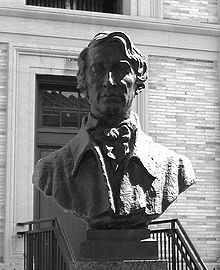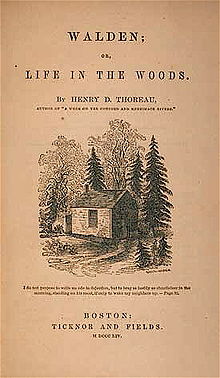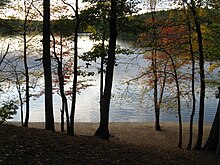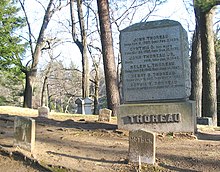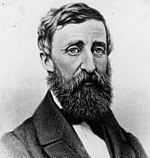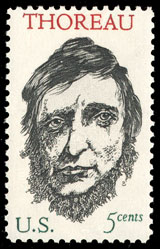Henry David Thoreau
Henry David Thoreau (Concord, Massachusetts, July 12, 1817-ibidem, May 6, 1862) was an American writer, poet, and philosopher of transcendentalist bent and Puritan origin, author of Walden and Civil Disobedience. Thoreau was surveyor, naturalist, lecturer and pencil manufacturer. One of the founding fathers of American literature, he is also the conceptualizer of the practices of civil disobedience.
Biography
Early Life and Education, 1817-1836
She was born in Concord, Massachusetts, into the "modest New England family" of John Thoreau, a pencil maker, and Cynthia Dunbar. His paternal grandfather was born in Jersey. His maternal grandfather, Asa Dunbar, led the 1766 Harvard student "Butter Rebellion," the first recorded student protest in the American colonies. David Henry was named so by his late paternal uncle, David Thoreau. He began calling himself Henry David after finishing college, but never applied for a legal name change. He had two older brothers, Helen and John Jr., and a younger sister, Sophia.Thoreau's birthplace still exists on Virginia Road in Concord. The house has been restored by the Thoreau Farm Trust, a non-profit organization, and is open to the public.
He studied at Harvard College from 1833 to 1837, then not yet the prestigious university it became at the turn of the century. He lived at Hollis Hall and took courses in rhetoric, classics, philosophy, mathematics, and science. He was a member of the 1770 Institute (now the Hasty Pudding Club). According to legend, Thoreau refused to pay the $5 fee for a Harvard diploma. In fact, the master's degree he refused to buy had no academic merit: Harvard College offered it to graduates "who demonstrated their physical worth by being alive three years after graduation, and their quality of saving, earning or inheriting by have five dollars to give to the school" and commented that it was better to "let each sheep keep its own skin", a reference to the tradition of using sheepskin parchment for diplomas.
Return to Concord, 1836-1842
The traditional professions open to college graduates—law, church, business, medicine—did not interest Thoreau, so in 1835 he took a leave of absence from Harvard, during which he taught at the school in Canton, Massachusetts.. After graduating in 1837, he began teaching at the Concord public school, but resigned after a few weeks so as not to have to administer corporal punishment. He and his brother John then opened Concord Academy, a grammar school in Concord, in 1838. They introduced various progressive concepts into their teaching, including nature walks and visits to local shops and businesses. The school closed when John fell fatally ill with tetanus in 1842 after cutting himself while shaving.He died in Henry's arms.
Upon graduation Thoreau returned home to Concord, where he met Ralph Waldo Emerson through a mutual friend. Emerson took a personal (sometimes even patronizing) interest in Thoreau, mentoring and introducing the young man to a circle of local writers and thinkers, including William Ellery Channing, Margaret Fuller and Amos Bronson Alcott, as well as the famous Nathaniel Hawthorne and his son (Julian Hawthorne), a boy at the time.
Emerson urged Thoreau to contribute essays and poems to a quarterly newspaper, The Dial, and lobbied the editor, Margaret Fuller, to publish those writings. Thoreau's first essay published in The Dial was "Aulus Persius Flaccus," an essay on the Roman satirist, in July 1840. It consisted of a revised passage from his Diary, which he had begun to keep at Emerson's suggestion. The first entry in this diary (October 22, 1837) says: & # 34; He asked what is he doing now? Do you have a diary? So I'm writing my first entry today."
Thoreau was a philosopher who devoted his efforts to studying nature and its relationship to the human condition. In his early years he followed Transcendentalism, a loose and eclectic idealistic philosophy championed by Emerson, Fuller, and Alcott. They held that an ideal spiritual state transcends or goes beyond the physical and the empirical, and that this is achieved through personal intuition rather than religious doctrine. In his opinion, nature is the outward sign of the inward spirit, and expresses the "radical correspondence of visible things and human thoughts," as Emerson wrote in Nature (1836)..
On April 18, 1841, Thoreau moved into the Emerson home. There (1841-1844), he served as the children's tutor. He was also an editorial assistant, a repairman and a gardener. For a few months in 1843 he moved to the home of William Emerson on Staten Island, and taught the family's children while seeking contacts among literati and journalists in the city who might help publish his writings, including his future literary representative. Horace Greley.
Thoreau returned to Concord to work in his family's pencil factory, a job in which he spent most of his adult life. He rediscovered the process of making good pencils out of inferior graphite but using clay for placement. This invention was improved upon by graphite found in New Hampshire and purchased in 1821 by his relative Charles Dunbar (the process of mixing graphite and clay, known as the Conté process, was patented by Nicolas-Jacques Conté in 1795). The other source for him had been Tantiusques, a Native American-operated mine in Sturbridge, Massachusetts. Thoreau later adapted the factory to produce the plumbago (graphite) used in electrotypes.
Once in Concord, Thoreau went through a period of unease. In April 1844 he and his friend Edward Hoar accidentally started a fire that consumed 300 acres (1.2 km²) of Walden Woods.
Civil Disobedience and the Walden Years, 1845-1849
I went to the woods because I wanted to live alone, deliberately, to face the essential facts of life and see if I could learn what I had to teach and not discover, at the time of death, that I had not lived. I didn't want to live what wasn't life, nor did I want to practice renunciation, unless necessary. I wanted to live deeply and extract the whole marrow into life, live in such an intense and spartan way that I could dispense with everything that wasn't life... (H. D. Thoreau, "Where I lived, what I lived for" Walden, or Life in Forests)
Thoreau felt the need to focus and work harder on his writing. In March 1845, Ellery Channing told Thoreau: "Go away, build a cabin, and begin the great process of devouring yourself: I see no alternative, no hope for you." Two months later, Thoreau embarked on a two-year experiment in simple living that began on July 4, 1845, when he moved into a small house he had built on land owned by Emerson in a reforestation forest around the shores of Walden Pond.
The house was in "a pretty meadow and woods" of 14 acres (57,000 m²) that Emerson had purchased, 2.4 km from his family home.
On July 24 or July 25, 1846, Thoreau met with the local tax collector, Sam Staples, who asked him to pay six years of back taxes. Thoreau refused to pay due to his opposition to the Mexican-American War and slavery, and he spent a night in jail for this refusal. The next day, Thoreau was released against his will when someone, probably his aunt, paid the tax, against his wishes. The experience had a strong impact on Thoreau, and he wrote that "under a government that unjustly imprisons anyone, The home of an honest man is jail." In January and February 1848 he gave lectures on The Rights and Duties of the Individual in Relation to Government, explaining his tax resistance at the Concord Lyceum. Bronson Alcott attended the conference, writing in his diary on January 26:
I attended Thoreau's conference at the Lyceum on the individual's relationship with the state. An admirable statement of the individual's rights to self-government. An attentive audience. All his allusions to the war in Mexico, the expulsion of Carolina from Mr. Hoar, his imprisonment in Concord prison for refusing to pay his tax. And all reasoned. I had great pleasure in this Thoreau intervention. (Bronson Alcott, Journals)
Thoreau reviewed the lecture in Essay Concerning Resistance to Civilian Government (also known as Civil Disobedience) in which he hinted at his political views. In this text one of the main concepts of his thought is declared: an ascetic and extreme individualism ("any man who is more right than his fellow men already constitutes a majority of one"; "man is rich in proportion to the quantity of things you can do without"; "in my house there were three chairs: one for solitude, two for friendship, three for society") and the idea that the government should not have more power than the citizens are willing to to yield to him, reaching such a point that he proposes the abolition of all government. He was also a puritan with a very high ethical conscience: "Kindness is the only investment that never goes bankrupt."
The essay powerfully influenced Leo Tolstoy and Mahatma Gandhi and was published by Elizabeth Peabody in The Esthetic Papers (May 1849). Thoreau had been inspired by a political poem by Englishman Percy Shelley, The Mask of Anarchy (1819), where he lashes out with powerful imagery at the unjust forms of authority of his time and imagines a radically new social action
In his own hand-built cabin, Walden Pond, Thoreau completed a first draft of A Week on the Concord and Merrimack Rivers, an elegy to his brother John describing his trip to the White Mountains in 1839. Thoreau could not find a publisher for the book, so he printed 1,000 copies at his expense; fewer than 300 were sold. On Emerson's advice, he employed Munroe's publishing imprint, Emerson's own publisher, despite the little interest he showed in publishing it.
In August 1846 Thoreau briefly left Walden for a trip to Mount Katahdin in Maine, a trip later described in "Ktaadn," part one of The Maine Woods / Los bosques de Maine .
Thoreau left Walden Pond on September 6, 1847. At Emerson's request, he moved back into the Emerson home to help his wife Lidian run the household while her husband was away on an extended tour of Europe.. At that time, in a labor that took him several years and while he worked to pay off his debts, he continually revised the manuscript of what he finally published as Walden, or Life in the Woods in 1854, where he narrated the two years, two months and two days that he had spent alone (or rather accompanied by the various manifestations of nature) at Walden Pond. The book compresses that time into a single calendar year, using the passing of the four seasons to symbolize human development. Walden had few admirers at the time, but later critics have regarded this work as an American classic that explores natural simplicity, harmony, and beauty as models for just social and cultural conditions.
American poet Robert Frost wrote of Thoreau: "Exceeds anything we have had in America." John Updike added: "A century and a half after it was published, Walden has become a totem of the preservationist, anti-business mentality of civil disobedience and return to nature. Thoreau is such a vivid expositor, so perfect and so hermit, that the book risks being like the Bible: as revered as unread'. Henry Miller, for his part, stated that "Thoreau is the strangest thing that it can be found on the Earth's layer: it is an individual».
Thoreau left Emerson's house in July 1848 and took up residence in another on nearby Belknap Street. In 1850, he and his family moved to one at 255 Main Street where he lived until his death.
Last years, 1851-1862
By 1851, Thoreau became increasingly fascinated by natural history and books of travel and exploration. He avidly read botany, and very often wrote observations on this subject in his journal. He admired William Bartram and Charles Darwin for their Voyage of the Beagle . He made detailed observations of the nature of Concord, recording the times of fruit ripening, the depths of Walden's Pond, and the days when certain birds migrated. The objective of this task was to "anticipate" the seasons of nature.
He became a surveyor and continued to write increasingly detailed observations on the natural history of the city, which covered an area of 67 km², in his journal, a two-million-word document he kept for 24 years between 1837 and 1861. In it are many materials that later appear in his essays. The impression he gives is that of Thoreau always on the move and interacting with his natural and social environment. It should be noted that the annotations of his walks always offer discoveries. The Diary is a book where the reader can follow his gaze, his hearing, his sense of smell and his enthusiasm and curiosity as a naturalist through his daily activities, expressing everything with characteristic and beautiful simplicity of it.
He also kept a series of notebooks, and these observations became the source of his later writings on natural history, such as Autumn Shades, Succession of Trees, and < i>Wild Apples, an essay lamenting the destruction of indigenous wild apple species.
Until the 1970s, literary critics dismissed Thoreau's later activities as "amateur science". But with the rise of environmental history and ecocriticism as academic disciplines, new readings of Thoreau began to emerge that demonstrated how pioneering he was and how good an analyst of ecological patterns he had become of fields and forests. For example, his latest essay, titled Forest Tree Succession shows that he used experimentation and analysis to explain how forests regenerate after fire or human destruction through seed dispersal. by winds or animals.
He traveled to Quebec once, Cape Cod four times, and Maine three times. These landscapes inspired his travel books A Yankee in Canada, Cape Cod and The Maine Woods , in which travel itineraries frame his thoughts on geography, history, and philosophy. Other travels took him southwest to Philadelphia and New York City in 1854, and west across the Great Lakes region in 1861, when he visited Niagara Falls, Detroit, Chicago, Milwaukee, St. Paul, and Mackinac. Island.
He also read extensively about travels in other lands. He devoured every firsthand travel account available in his day, at a time when the last unmapped regions of the earth were being explored. He read Magellan and James Cook, the arctic explorers John Franklin, Alexander Mackenzie and William Parry, the Africanists David Livingstone and Richard Francis Burton; Lewis and Clark, early American travelers into the Rocky Mountains, and hundreds of lesser-known works by explorers and travelers who were also fine writers. Astonishing amounts of reading fueled his endless curiosity about the world's peoples, cultures, religions, and natural history, and left their mark as critical comments in his voluminous journals. And he poured all that knowledge into the local lab from his experience in Concord. It is not for nothing that his advice to "live at home like a traveler" appears among his famous aphorisms.
Death
He contracted tuberculosis in 1835 and suffered from it sporadically afterward. In 1860, after a nocturnal excursion to count the rings of stumps during a rain, he fell ill with bronchitis, his health declined, with brief periods of remission, and finally he remained in bed. Recognizing the terminal nature of his illness, Thoreau spent his later years reviewing and proofreading his unpublished works, particularly the excursions in Maine, and asking publishers to print revised editions of A Week... and from Walden. He wrote letters and entries in the Diary of him until he became too weak to continue. He alarmed his friends at his wasted appearance and they were fascinated by his calm acceptance of death. When asked by his aunt Luisa in her last weeks if she was at peace with God, Thoreau replied: "I didn't know we had a fight."
Aware he was dying, Thoreau's last words were "Now comes good sailing," followed by two lonely words, "moose" e & # 34; Indian & # 34;. He died on May 6, 1862 at the age of 44 years. Bronson Alcott organized the funeral ceremony and read a selection of passages from Thoreau; Channing presented a hymn. Emerson wrote the eulogy delivered at the funeral. Thoreau was buried in the Dunbar family plot. His remains and those of his immediate family were later moved to Sleepy Hollow Cemetery in Concord, Massachusetts.
A friend of Thoreau's, Ellery Channing, published his first biography, Thoreau, the Naturalist Poet, in 1873. Channing and another friend, Harrison Blake, edited some poems, essays, and entries from his < i>Diary for a posthumous miscellany to be published in the 1890s. These diaries by Thoreau, which he often used as a source for his published works, remained largely unpublished until his death and were first published once quite complete in 1906, helping to build the writer's great modern reputation. A new, expanded edition of the Diaries is in the works, published by Princeton University Press. Today Thoreau is regarded as one of the greatest American writers, both for the modern clarity of his prose style and for the prescience of his views on nature and politics. His memory is honored by the International Thoreau Society and by the Thoreau Institute at Walden Woods, established in 1998 in Lincoln, Massachusetts.
Published Works
Some of his writings were published posthumously.
- Aulus Persius Flaccus (1840)
- The Service (1840)
- A Walk to Wachusett (1842)
- Paradise (to be) Recovered (1843)
- The Lanlord (1843)
- Sir Walter Raleigh (1844)
- Freedom Herald (1844)
- Wendell Phillips Before the Concord Lyceum (1845)
- Reform and the Reformers (1846-8)
- Thomas Carlyle and his Work (1847)
- A Week in the Concord and Merrimac Rivers (1849)
- Civil disobedience (Civil disobedience1849)
- An Excursion to Canada (1853)
- Slavery in Massachusetts (1854)
- Walden (1854)
- Apology of Captain John Brown (1859)
- Remarks After the Hanging of John Brown (1859)
- The Last Days of John Brown (1860)
- Walk (1861)
- Autumnal Tints (1862)
- Wild Apples: The History of the Apple Tree (1862)
- Excursions (1863)
- A Life Without Principles (1863)
- Night and Moonlight (1863)
- The Highland Light (1864)
- The Maine Woods (1864)
- Cape Cod (1865)
- Early Spring in Massachusetts (1881)
- Summer (1884)
- Winter (1889)
- Autumn (1892)
- Miscellanies (1894)
Works in Spanish
- Walden. Madrid: Chair, 2007/ Madrid: Errata naturae, 2013.
- Civil disobedience and other writings. Madrid: Alianza, 2012.
- Disobedience. Anthology of political trials. Madrid: Errata naturae, 2015.
- Letters to a self-seeker. Madrid: Errata naturae, 2013.
- Walden. 200th anniversary of the birth of Henry David Thoreau. Madrid: Errata naturae, 2017.
- Everything good is free and wild. Madrid: Errata naturae, 2017.
- Musketaquid. Madrid: Errata naturae, 2014.
- A winter walk. Madrid: Errata naturae, 2014.
- Walk. Madrid: Ardora, 1998/ Barcelona: Angle, 2017.
- Complete poetry. The gold rooster, 2018.
- The spring. Barcelona: Indomite page, 2016.
- A life without principles. Buenos Aires: Ediciones Godot, 2017.
- Autumn colors. Palma de Mallorca: José J. de Olañeta, 2011.
- Dear Waldo. Correspondence between Ralph Waldo Emerson and Henry David Thoreau. Free network, 2018.
- Wild apples. Palma de Mallorca: José J. de Olañeta, 2014.
- A Yankee in Canada. Santa Cruz de Tenerife: Baile del Sol, 2011.
- The Forests of Maine. Tenerife: Baile del Sol, 2007.
- Write. Valencia: Pre-texts, 2007.
- Fly. Logroño: Pumpkin nuggets, 2016.
- The night and moonlight. Buenos Aires: Ediciones Godot, 2020. ISBN 9789878413044.
Influence
Thoreau's painstaking observations and devastating conclusions have magnified over time, becoming stronger than his weaknesses. Events unrelated to his stay at Walden Pond have been linked to him: the British labor movement, Indian independence, the civil rights movement, the hippie revolution, the environmental movement, and the desert movement. Today, Thoreau's words are quoted with feeling by liberals, socialists, anarchists, libertarians, and conservatives alike.
Thoreau's political writings had little impact during his lifetime, as his contemporaries saw him not as a theoretician or radical, but as a naturalist. They ignored his political essays, including Civil Disobedience. Unlike his Essays, only Walden and A Week on the Concord and Merrimac Rivers (1849), dealing with the nature in which he loved to walk. However, Thoreau's political writings influenced many prominent public figures: political leaders and reformers such as Mahatma Gandhi, US President John F. Kennedy, American civil rights activist Martin Luther King, Jr.., William O. Douglas and the Russian author Leo Tolstoy stated that they were strongly influenced by Thoreau's work, particularly his Civil Disobedience, as did the right-wing theorist Frank Chodorov, who dedicated an edition from his monthly scan to a Thoreau review.
Thoreau also influenced many artists and writers: Edward Abbey, Willa Cather, Marcel Proust, W. B. Yeats, Sinclair Lewis, Ernest Hemingway, Upton Sinclair, Lewis Mumford, Alexander Posey, and Gustav Stickley, for example.
Naturalists who appreciated his work included John Burroughs, John Muir, E. O. Wilson, Edwin Way Teale, Joseph Wood Krutch, B. F. Skinner, David Brower, and Loren Eiseley, whom Publishers Weekly called "the modern Thoreau". For example, Edward O. Wilson begins his book on The Future of Life (2002) with a letter addressed to Thoreau.
The English writer Henry Stephens Salt wrote a biography of Thoreau in 1890 that spread Thoreau's ideas throughout Britain: George Bernard Shaw, Edward Carpenter, and Robert Blatchford were among Thoreau's enthusiasts as a result of Salt's advocacy of his work. The then lawyer Gandhi first read Walden in 1906, while working as a civil rights activist in Johannesburg, South Africa. He first read "Civil Disobedience" while in a South African jail for the crime of nonviolently protesting discrimination against Indians in the Transvaal. The essay galvanized Gandhi, who wrote and published a synopsis of Thoreau's thought highlighting his "incisive logic [...] without answer"; and referred to Thoreau as "one of the greatest and most moral men America has ever produced"., and I recommended Thoreau's study to all my friends who were helping me in the cause of Indian Independence. Because I actually took the name of my movement from Thoreau's essay Civil Disobedience, written about 80 years ago".
Martin Luther King noted in his Autobiography that his first encounter with the idea of nonviolent resistance was reading Civil Disobedience in 1944 while attending Morehouse College. He wrote there that the "refusal to pay his taxes and the option of imprisonment is something that supported the fight to segregate the territory won from Mexico from slavery." I made my first contact with the theory of nonviolence fascinated by the idea of refusing to cooperate with an evil system; I was so moved that I re-read the work several times, convinced that non-cooperation with evil is as much a moral obligation as cooperation with good. I have been eloquent and passionate in conveying this idea of Henry David Thoreau. As a result of his writings and personal testimony, we are the inheritors of a legacy of creative protest. Thoreau's teachings came to life in our civil rights movement. They are more alive than ever, whether expressed in a sit-in at diner counters or a freedom walk in Mississippi, a peaceful protest in Albany, Georgia, or a bus boycott in Montgomery, Alabama. It is a consequence of Thoreau's insistence that evil must be resisted and that no moral man can patiently adapt to injustice".
In 1960, an effigy of Thoreau was inducted into New York University's Pantheon of American Heroes, alongside George Washington, Benjamin Franklin, Abraham Lincoln, Thomas Edison, and Ralph Waldo Emerson.
In 1998, United States President Bill Clinton proposed it as an example of best civic practices and affirmed the moral superiority of civil disobedience over violence.
The American psychologist B. F. Skinner wrote that he carried a copy of Thoreau's Walden with him in his youth. And, in 1945, he wrote Walden Two, a fictional utopia of some 1,000 members of a community living together inspired by the life of Thoreau. Thoreau and his fellow Concord transcendentalists were a major inspiration for composer Charles Ives. The fourth movement of the Concord Sonata for piano (with a part for flute, the instrument Thoreau played) is an exposition of Thoreau's character and thought.
Actor Ron Thompson gave a dramatic portrayal of Henry David Thoreau in the 1976 NBC television series The Rebels.
Thoreau's ideas have impacted and resonated with the anarchist movement, with Emma Goldman referring to him as "American's greatest anarchist'. Green anarchism and anarcho-primitivism in particular have drawn inspiration and ecological views of Thoreau's writings. John Zerzan included Thoreau's text Excursions (1863) in the collection of texts from the anarcho-primitivist tradition entitled Against Civilization: Readings and Reflections. In addition, Murray Rothbard, founder of anarcho-capitalism, has opined that Thoreau was one of the "great intellectual heroes" of his movement. Thoreau was also a major influence on anarchist naturism of the late 19th century . On a global level, Thoreau's concepts were also important within individualist anarchist circles in France, Spain and Portugal.
Nature and human existence
Most of the luxury and many of the so-called comforts of life are not only indispensable, but positively also obstacles to the rise of humanity. (H. D. Thoreau, Walden.)
Thoreau was an early advocate of recreational hiking and canoeing, conservancy or conserving natural resources on private land, and preserving the wilderness as public land. He himself was a highly skilled canoeist. Nathaniel Hawthorne, after walking with it, remarked that "Mr. Thoreau handled the boat so perfectly, whether with two paddles or one, that it seemed to obey its own will instinctively and required no physical effort to guide it." 3. 4;.
He was not a strict vegetarian, though he said he preferred that diet, and advocated it as a means of self-improvement. He wrote in Walden: & # 34;The practical objection to animal food in my case was its filthiness, and besides, when I had caught and cleaned, cooked and eaten my fish, they seemed not to have been fed at all. the essential. It was petty and unnecessary, and it cost more than he got any use for: a little bread or a few potatoes would have done it with less trouble and mess.”
Thoreau neither rejected civilization nor fully embraced the barbarism of the wasteland. Instead, he sought a middle ground, a pastoral, Arcadian realm that integrated nature and culture. His philosophy required him to be the didactic arbiter between the desert he so believed in and the growing human mass of America. He felt that a teacher had to be close to those who needed to hear what he wanted to say. The wild nature he enjoyed was near swamp or forest, and he preferred "partly cultivated country." The idea of him being "far away in the recesses of the desert"; de Maine was 'walk the lumberjack trail and the Indian trail', but he, too, ascended to pristine and primeval lands. In the essay Henry David Thoreau, Philosopher Roderick Nash wrote: “Thoreau left Concord in 1846 to make the first of his three voyages to northern Maine. His expectations were high, because he hoped to find the authentic, primitive America. Maine affected him in a very different way than the idea of the wilderness in Concord: Instead of coming out of the woods with a deep appreciation for the jungles, Thoreau had a greater respect for civilization and an understanding of the need for balance'.
Regarding alcoholic beverages, Thoreau wrote: "I would like to keep sober always... I believe that water is the only drink for a wise man; wine is not such a noble liquor".
Politics
Thoreau was a fervent anti-slavery activist and an active supporter of the abolitionist movement. He gave lectures attacking the Fugitive Slave Law, and, contrary to popular opinion at the time, supported radical abolitionist militia leader John Brown and his party. Two weeks after Brown's ill-fated raid on Harpers Ferry, West Virginia (1859), and in the weeks leading up to Brown's execution, Thoreau delivered an Address to the Citizens of Concord, Massachusetts, in which he compared the American government to Pontius Pilate and compared the execution of Brown to the crucifixion of Jesus Christ. In The Last Days of John Brown, Thoreau described the words and deeds of John Brown as noble and an example of heroism.
Thoreau advocated limited government and individualism. Although he hoped that humanity could potentially have, through self-improvement, the kind of government that "doesn't rule at all," he distanced himself from contemporary anarchists writing: "I don't ask that there be no a government, but a better government".
Thoreau considered the evolution from absolute monarchy to monarchy limited by democracy as "a progress towards true respect for the individual" and he theorized about new improvements "towards the recognition and organization of the rights of man". Echoing this belief, he writes: "There will never be a truly free and enlightened State until the State comes to recognize the individual as a higher and independent power from which all its power and authority is derived and treats him accordingly." & # 3. 4;.
Although Thoreau believed that resistance to unfairly exercised authority could be both violent (exemplified in his support for John Brown) and nonviolent (his own example of tax resistance shown in resistance to civilian rule), he considered nonresistance to be pacifist. as a temptation to passivity, writing: "Let not our peace be proclaimed by the rust of our swords, nor by our inability to draw them from their scabbards, but let him have at least as much work on his hands as to keep them shining and sharp".
Similarly, his condemnation of the US intervention in Mexico did not stem from pacifism, but rather because he considered Mexico "unjustly invaded and conquered by a foreign army" as a means to expand the territory of slavery.
Thoreau was ambivalent toward industrialization and capitalism. On the one hand he regarded trading as "unexpectedly confident and collected, adventurous and tireless"; and he expressed admiration for the cosmopolitanism associated with it, writing:
I am fresh and comforted when the goods stumble beyond me and smell the shops that are dispensing their scents all over the route from Long Wharf to Lake Champlain, and evoke me strange places: coral reefs, the Indian Ocean, tropical climates and the extension of the globe. I feel more cosmopolitan contemplating the palm leaf that will cover so many heads of New England next summer.
On the other hand, he wrote disparagingly about the factory system:
I can't believe our manufacturing system is the best way for men to get clothes. The condition of the operators is becoming more like that of the English every day; and this cannot be admitted, since, as far as I have heard and observed, the main purpose is not that humanity is well dressed, but, undoubtedly, that the corporations can be enriched.
Thoreau also favored bioregionalism, the protection of animals and wilderness areas, free trade, and the imposition of taxes to finance schools and roads. He disapproved of the subjugation of Native Americans, slavery, technological utopianism, consumerism, philistinism, mass entertainment, and frivolous applications of technology.
Contenido relacionado
Agnes of God
True story of the conquest of New Spain
Aeschylus
